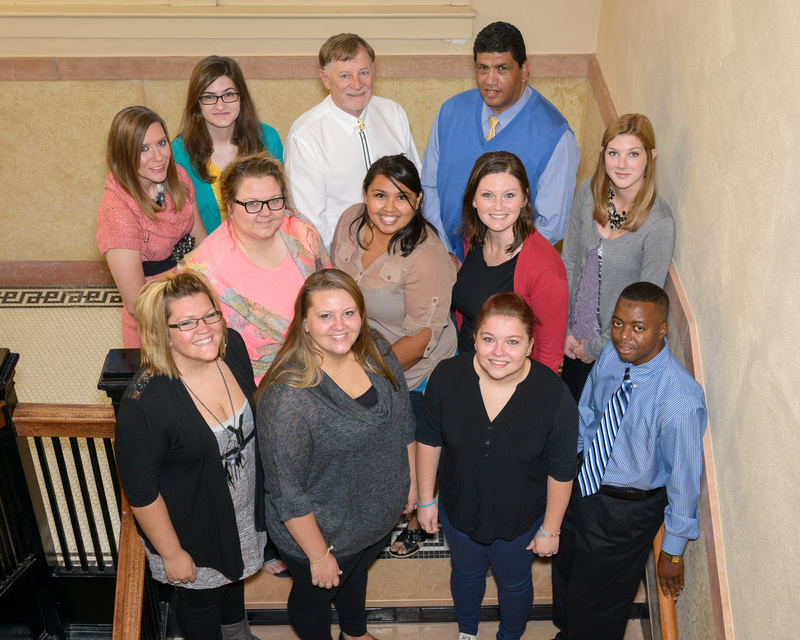Collaboration a common concern of child welfare conference speakers

Experts on topics ranging from Internet sex crimes against children, the Indian Child Welfare Act (ICWA), mental health, poverty, truancy and juvenile justice, spoke at the annual Chadron State College Social Work 435 class conference Wednesday in the Student Center.
A thread of agreement ran through comments by multiple speakers regarding the need for increased collaboration among schools, courts and other agencies responsible for serving and protecting juveniles.
Dawes County Judge Russ Harford, a supporter of the conference, commended the efforts of the CSC students who organized the event.
“With the many changes in juvenile justice, this conference presented a lot of pertinent, relevant and valuable information,” Harford said.
Harford acknowledged the valuable contributions of Rebecca Fernau who assisted the CSC students with planning the program. Fernau is a graduate of the CSC social work program and caseworker with the Nebraska Department of Health and Human Services in Chadron.
Keynote speaker Corey Steel, state court administrator, shared an overview of LB 561 and LB 464. LB 561 established a pilot program in Omaha to reform juvenile justice from incarceration to rehabilitation.
LB 464 expanded the program statewide and was a monumental shift in providing services for juveniles in the justice system, according to Steel.
Steel added probation officers working with juveniles have taken on more of a case manager role and oversee all standard steps in the probation process with an increased focus on juveniles’ supervised re-entry into society.
The transition, which was accomplished in nine months, should have taken two to three years, according to Steel.
“Juveniles are different from adults and they have different needs. Research shows that a young person’s brain is not fully developed until 24,” Steel said
Jeanne Brandner, deputy state court administrator, assisted with the keynote address. She echoed Steel’s comments about the specialized skills and training needed by those working with juveniles.
“A collaborative community effort is needed among the families, schools and churches. School is a critical hook which can help keep youth engaged,” Brandner said.
During a panel discussion following the keynote, William Cross of Gordon, Nebraska, social worker with the ICWA ONTRAC office in Pine Ridge, South Dakota, challenged the Oglala Sioux tribe and CSC to collaborate more often to support Native American children.
ICWA is a 1978 federal act intended to place Native American children who are removed from their homes by courts due to neglect or abuse, with extended family or other Native homes where their culture can be fostered and strengthened.
Placement with non-Native families is also possible, based on assessments by ICWA case workers in their respective state. Nebraska interpretation of ICWA requires that Nebraska children removed from their home be placed in another Nebraska home.
Juanita Sherick, director of the ICWA ONTRAC office, asked those in attendance to actively help identify Native American families in Nebraska with which children could be placed.
“Every state struggles with not having enough Native homes,” she said.
Cross said that acquiring state legal reports and medical reports in child neglect and abuse cases is complex and time-consuming. He said better collaboration would help the tribe expedite ICWA hearings and decisions.
Chadron Public Schools superintendent Dr. Carolyn Winchester mentioned during the panel discussion that the protection and rehabilitation of juveniles is a complicated issue which requires the efforts of everyone involved.
The conference was the culmination of months of planning by students enrolled in SW 435. They were assisted by CSC ROTC members and majors in criminal justice and legal studies.
Coy Clark of Benkelman, Nebraska, chairman of the eight-member Justice Studies Conference Task Force said he was thankful for the opportunity to help.
“The conference was very successful and a great experience for not only myself and the task force, but also for all of the criminal justice and legal studies students who attended,” Clark said.
Clark also thanked Dr. Lisette Leesch and the justice studies faculty for their support and involvement in the task force.
ROTC cadet Dalton Boden said the social work class does a great service for the campus and community by offering the annual conference.
"Our mission is to serve this country and community. This conference is a great opportunity for us to do just that," Boden said.
Category: Campus Events, Campus News, Social Work
